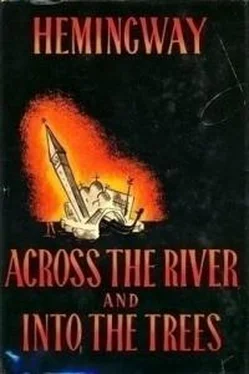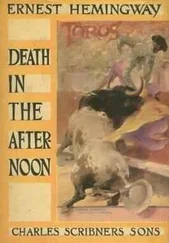1 ...8 9 10 12 13 14 ...48 'I've seen them quite well costumed in Brussels,' the Colonel said. 'A well–fed, gay capital. Win, lose, or draw.'
'We should have fought in Flanders in the old days.'
'We were not born in the old days,' the Colonel said. 'So we automatically could not have fought then.'
'I wish we could have fought with the Condottieri when all you had to do was out–think them and they conceded. You could think and I would convey your orders.'
'We'd have to take a few towns for them to respect our thinking.'
'We would sack them if they defended them,' the Gran Maestro said. 'What towns would you take?'
'Not this one,' the Colonel said. 'I'd take Vicenza, Bergamo and Verona. Not necessarily in that order.'
'You'd have to take two more.'
'I know,' the Colonel said. He was a general now again and he was happy. 'I figured that I'd by–pass Brescia. It could fall of its own weight.'
'And how are you, Supreme Commander?' the Gran Maestro said, for this taking of towns had pulled him out of his depth.
He was at home in his small house in Treviso, close to the fast–flowing river under the old walls. The weeds waved in the current and the fish hung in the shelter of the weeds and rose to insects that touched the water in the dusk. He was at home, too, in all operations that did not involve more than a company and understood them as clearly as he understood the proper serving of a small dining–room; or a large dining–room.
But when the Colonel became a general officer again, as he had once been and thought in terms that were as far beyond him as calculus is distant from a man who has only the knowledge of arithmetic, then he was not at home and their contact was strained and he wished the Colonel would return to things they both knew together when they were a lieutenant and a sergeant.
'What would you do about Mantova?' the Colonel asked.
'I do not know, my Colonel. I do not know whom you are fighting, nor what forces are at your disposal.'
'I thought you said we were Condottieri. Based on this town or on Padova.'
'My Colonel,' the Gran Maestro said, and he had diminished in no way, 'I know nothing, truly, about Condottieri. Nor really how they fought then. I only said I would like to fight under you in such times.'
'There aren't any such times any more,' the Colonel said and the spell was broken.
What the hell, maybe there never was any spell, the Colonel thought. The hell with you, he said to himself. Cut it out and be a human being when you're half a hundred years old.
'Have another Carpano ,' he said to the Gran Maestro .
'My Colonel, you will allow me to refuse because of the ulcers?'
'Yes. Yes. Of course. Boy, what's your name, Giorgio? Another dry Martini. Secco, molto secco e doppio .'
Breaking spells, he thought. It is not my trade. My trade is killing armed men. A spell should be armed if I'm to break it. But we have killed many things which were not armed. All right, spell breaker, retract.
' Gran Maestro ,' he said. 'You are still Gran Maestro and ― the Condottieri.'
'They were ― many years ago, Supreme Commander.'
'Exactly,' the Colonel said.
But the spell was broken.
'I'll see you at dinner,' the Colonel said. 'What is there?'
'We will have anything you wish and what we do not have I will send out for.'
'Do you have any fresh asparagus?'
'You know we cannot have it in these months. It comes in April and from Bassano.'
'Then you think of something and I'll eat it,' the Colonel said,
'How many will you be?' the Maitre d'Hotel asked.
'We'll be two,' the Colonel said. 'What time do you close the bistro?'
'We will serve dinner as late as you wish to eat, my Colonel.'
'I'll try to be in at a sound hour,' the Colonel said. 'Good–bye, Gran Maestro ,' he said and smiled and gave the Gran Maestro his crooked hand.
'Good–bye, Supreme Commander,' said the Gran Maestro and the spell was existent again and almost complete.
But it was not quite complete and the Colonel knew it and he thought: why am I always a bastard and why can I not suspend this trade of arms and be a kind and good man as I would have wished to be.
I try always to be just, but I am brusque and I am brutal and it is not that I have erected the defence against brown–nosing my superiors and brown–nosing the world. I should be a better man with less wild boar blood in the small time which remains. We will try it out to–night, he thought. With whom, he thought and where, and God help me not to be bad.
'Giorgio,' he said to the barman, who had a face as white as a leper, but with no bulges and without the silver shine.
Giorgio did not really like the Colonel very much, or perhaps he was simply from Piemonte and cared for no one truly; which was understandable in cold people from a border province. Borderers are not trusters and the Colonel knew about this and expected nothing from anyone that they did not have to give.
'Giorgio,' he said to the pale–faced barman. 'Write these down for me, please.'
He went out, walking as he had always walked, with a slightly exaggerated confidence, even when it was not needed and, in his always renewed plan of being kind, decent and good, he greeted the concierge, who was a friend, the assistant manager, who spoke Swahili and had been a prisoner of war in Kenya and was a most amiable man, young, full of juice, handsome, perhaps not yet a member of the Order, and experienced.
'And the cavaliere ufficiale who manages this place?' he asked. 'My friend?'
'He is not here,' the assistant manager said. 'For the moment, naturally,' he added.
'Give him my compliments,' the Colonel said. 'And have somebody show me to my room.'
'It is the usual room. You still wish it?'
'Yes. Have you taken care of the Sergeant?'
'He is well taken care of.'
'Good,' said the Colonel.
The Colonel proceeded to his room accompanied by the boy who carried his bag.
'This way, my Colonel,' the boy said, when the elevator halted with slight hydraulic inaccuracy at the top floor.
'Can't you run an elevator properly?' the Colonel asked.
'No, my Colonel,' the boy said. 'The current is not stable.'
The colonel said nothing and preceded the boy down the corridor. It was large, wide and high ceilinged and there was a long and distinguished interval between the doors of the rooms on the side of the Grand Canal. Naturally, since it had been a palace, there were no rooms without excellent views, except those which had been made for the servants.
The Colonel found the walk long, although it was a very short one and when the waiter, who served the room, appeared, short, dark and with his glass eye in the left eye socket, gleaming, unable to smile his full, true smile as he worked the big key in the lock, the Colonel wished that the door would open more rapidly.
'Open it up,' he said.
'I will, my Colonel,' the waiter said. 'But you know these locks.'
Yes, the Colonel thought. I know them, but I wish that he would get it open.
'How are your family?' he said to the waiter, who had swung the door wide so that the Colonel, now entered, was within the room with the high, dark but well–mirrored armoire, the two good beds, the great chandelier and the view, through the still closed windows, on to the wind–beaten water of the Grand Canal.
The Canal was grey as steel now in the quick, failing, winter light and the Colonel said, 'Arnaldo, open the windows.'
'There is much wind, my Colonel, and the room is badly heated due to the lack of electric power.'
'Due to the lack of rainfall,' the Colonel said. 'Open the windows. All of them.'
Читать дальше
Конец ознакомительного отрывка
Купить книгу












